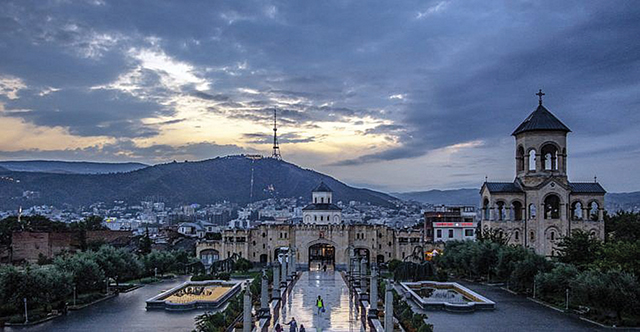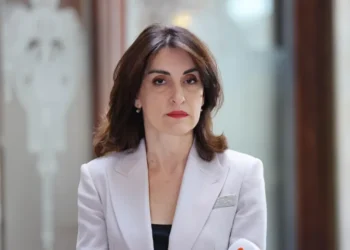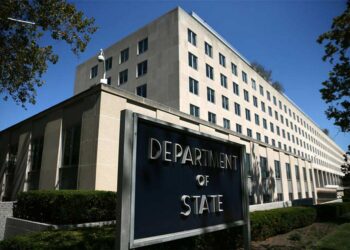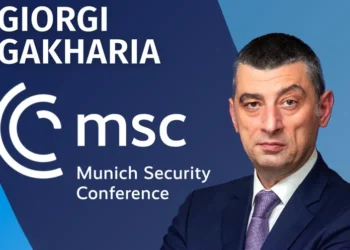Analysis
The past year of 2020 was not just another year. Its dramatic nature showed us once again, and quite severely, the full intensity of the challenges that could arise when several large-scale crises occur at once. In fact, in parallel with the distortion of the international political line, economic imbalance and inadequate governance systems, the global pandemic has further exposed old scars and added new, hitherto unknown, traits to the already familiar picture.
The natural result of this process is the study of the risks and dangers posed by the pandemic, their ongoing diagnoses, and the search for effective ways to solve the crisis. Undoubtedly, it is important to deepen academic knowledge while working on the issues raised, but it is much more difficult and takes great responsibility to adapt the relevant knowledge in such a way so that it can help to actually address urgent concrete issues.
“From third to first”: Time and Necessity
Georgia is facing a multi-component task that needs to be solved. We must analyze with equal accuracy both the dynamics of global and regional trends and the anatomy of domestic challenges and determine the impact of the interrelationship of the first two and their effect on the third. Also, to determine with a minimal margin of error the forms of national consciousness and institutional development corresponding to world events. This task is aggravated by the fact that in parallel with finally overcoming the remaining, so-called Soviet legacy, the urgent objective is to materialize the idea of modern Georgian national-state unity oriented not merely towards tomorrow (time flies fast even without looking back), but the day after tomorrow.
We have mentioned before the uselessness of theoretical exercises detached from practice. However, it is also a fact that the success of any affair is based on understanding its conceptually correct beginnings, substantiating the principles that define the system, and finding the optimal point of intersection between historical memory, current process, and future mosaic. It is only possible with this condition to achieve what we often talk about: the formation of a systemic vision of the country’s development, the consolidation of society around it and, already for this time and generation, performing a modern miracle of our nation – jumping from the third world to the first.
Since the purpose of this article is not just a call and a reminder, we will try to point out some essential circumstances or factors without which long-term and consistent state development remains a hostage of routine puzzles, and national energy, talent and resources are consumed to overcome a daily, endless whirlpool of “one step forward, two steps back”. Overall, we may end up receiving an illusion “filled” with deceptive victories and ostensible successes “achieved” in one single circle. Of course, something like this is not in any of our interests: one of the main guarantees of our overall success is natural unity.
The environment that is formed around us
The more modest the role of Georgia in modern global processes, the greater the impact of these processes on the present-day life and development of our country. Such an inverse relationship would not be difficult to explain if not for the rearrangement of international relations from already well-known foundations to new, yet undeveloped and quite complex, risky, and, in many ways, muddy and untested beginnings.
We talked about this process many times over the past year, and in several articles have tried to specify and discuss its signs and peculiarities. Also, we have repeatedly related this process to Georgia’s agenda, defining as to how certain relationships are connected to key directions and what should be the purposeful response of Georgia; or what type of prevention should be in place to reduce the harmful effects of global trends as much as possible, and how to keep up with positive trends and make the most of any benefits.
The list of issues to be discussed in this regard is extensive. However, for now we will focus on just a few to highlight their natural bond with our country. We think we should unconditionally consider the role and weight of the great powers in the new system of international relations – as well as their relationships in the global and regional contexts. Such significant attention to the “constellation of the First World” carries a simple rationale: regardless of the various teachings, schools, or practical doctrines in international relations, the nature and content of these relationships were based on one simple and unequivocal factor and will remain so in the future. This factor is in the global geopolitical and geo-economic scene of “the powerful ones of this world”: the power of global and superregional states and their impact on processes and outcomes. Even though it is true that the theorists and practitioners have often “colorized” different stages of the twentieth and this century with fascinating doctrinal titles, behind them stood the laws of realism imbued by the world of Hobbes. We would not make this discussion any simpler by simply stating that power always rises. Of course, this is not always the case, but for the most part it is. And we must be ready for that, both for the ideology corresponding to Georgian realism and for the correct and adequate adaptation of the national resource to this ideology.
Georgians have many friends and partners in the world today. We have enemies as well as those who envy us: sometimes they are open and sometimes concealed. But whatever the balance or equation of friends and foes, the message of the New World Order is unmistakably read as follows: in advocating our development and interests, we must, first and foremost, rely on ourselves. And whatever is the support of the international system and law, its effectiveness and efficiency must rely on the main foundation – Georgian realism, qualified pragmatism and, in terms of values, – rationalism.
Following this introduction, we will briefly review a few sub-items.
A New Cold War?
The emergence of a new geopolitical contour in Eurasia is largely driven by the so-called Cold War between the US and China. We do not use the qualifier “so-called” here randomly. The use of these words is associated with one common mistake: equating their relations with those of the Cold War between the US and the USSR.
If we consider a few fundamental differences between these two confrontations, then we can properly understand the comparison as a mistake. Let us start with the fact that the leading line of the Cold War between the US and the USSR was overwhelmingly revealed in the rivalry between two ideological camps, while the confrontation between the US and China is not as much about ideology as about the distribution of spheres of influence mainly. China believes that the centuries-long “era of humiliation” is over, and it is time for the world to not only acknowledge their desire to be, but also to at last recognize China as a great state. A number of Chinese initiatives in recent years, both within the country and abroad, have served the purpose of achieving this goal. These initiatives are well known to readers.
Beijing’s traditional official rhetoric about the non-use of force against other states is noteworthy, as is its involvement in international institutions and various projects. This activity of China became especially noticeable during Trump’s presidency, and it has been followed by a reduction in cooperation by the United States in various international formats. Also noteworthy is the extraordinary attention paid to the Chinese model of governance during the pandemic, which has sparked a debate over the effectiveness of liberal and state forms of capitalism.
Without going into the details of drawing a comparison between the systems, this confrontation carries one very practical significance for Georgia: we are in one of the key geographical and geopolitical areas of the Eurasian space, the macro-region of the Black and Caspian Seas. In the context of a new series of large-scale competition of states in the Eurasian space, the growth of different interests in this macro-region is inevitable. This is directly related to the urgency of our state security and public resilience, as well as to the further deepening of our strategic alliances strengthened by the Constitution, so that it acquires new forms and essence. In addition, this line of alliances must somehow, which is utterly difficult!, be drawn in the constant mode of tension management and constant communication with large regional participants.
In short, Georgian realism must, in the shortest period, accommodate the two main tools for managing the coexistence of our national interests with the interests of others in the region, which lies in effective restraint and effective dialogue. We understand that the topic needs to be expanded upon, and it will be the subject of our next discussion. At this stage we will limit ourselves to a brief overview.
“More NATO in Georgia and more Georgia in NATO”
We all know this phrase by heart and have been hearing it for years now. The real meaning of which, similar to a famous Georgian song, is that the present might not favor us, but the future will belong to us (and not someone else).
Clearly, the process of integration with the Euro-Atlantic Alliance is not static: it is moving forward, acquiring new elements and content. At the same time, the significant and alarming processes around our country and allies is not motionless either – they seem to be developing at a faster pace than the intensity of NATO integration statements or even the addition of a few extra elements to the cooperation package. In this sense, despite our Foreign Ministry’s promising assessments, we do not think that the summary document of the last NATO summit has created the adequate effect that would be directly proportional to this period and its needs. There is a feeling that the dynamics of our membership in the Alliance has become a subject to the “a little later, a little bit less” approach, which is detrimental to an overall Western security design in Georgia, the region, and beyond.
In all fairness, it should be noted that the lack of the desired rhythm and pace in the process cannot and should not be attributed to the political will of Brussels alone. Here again we must recall the “inverted” world left behind by the post-classic Cold War period, and the pandemic made the system of international relations even more unpredictable. The uncertainty of the general environment is compounded by the noticeable fragmentation of a single political line within the alliance itself. To illustrate this point, we will cite as examples the socio-political differences and heterogeneity between NATO countries in Western and Eastern Europe; Turkish peculiarity, “to do what will benefit Turkey in the first place”; and European “strategic autonomy” in response to Trump’s famous policies. But all of these are clearly detached and far away from solving practical issues in the context of a country whose territory is occupied and its creeping expansion (say, annexation) is not interrupted, and the neighborhood environment requires the introduction of feasible (and not declarative) security mechanisms for the same country. At the end of the day, it is a question of fully considering the interests of a country that has not backed down for a single minute in its contribution to the common good.
Proper attention has been paid to the practical aspects of this particular issue in the past and is still being addressed. Here we just wanted to point out that it is now time for politically courageous decisions and effective steps. In this case as well, there are several options for our country and its allies to consider, starting with the collective and ending with regional or bilateral security systems. We have described them in previous publications. Proper readiness and realism are required to analyze each decision in a timely manner and to implement them without any hesitation. This is necessary for Georgia to have more national and more Black Sea regional stability, and not for the purpose of being perceived as a source of threat in our neighborhood.
Continued on georgiatoday.ge and in next week’s GT newspaper.
By Victor Kipiani, Chairman of Geocase
Image source: global-goose.com














